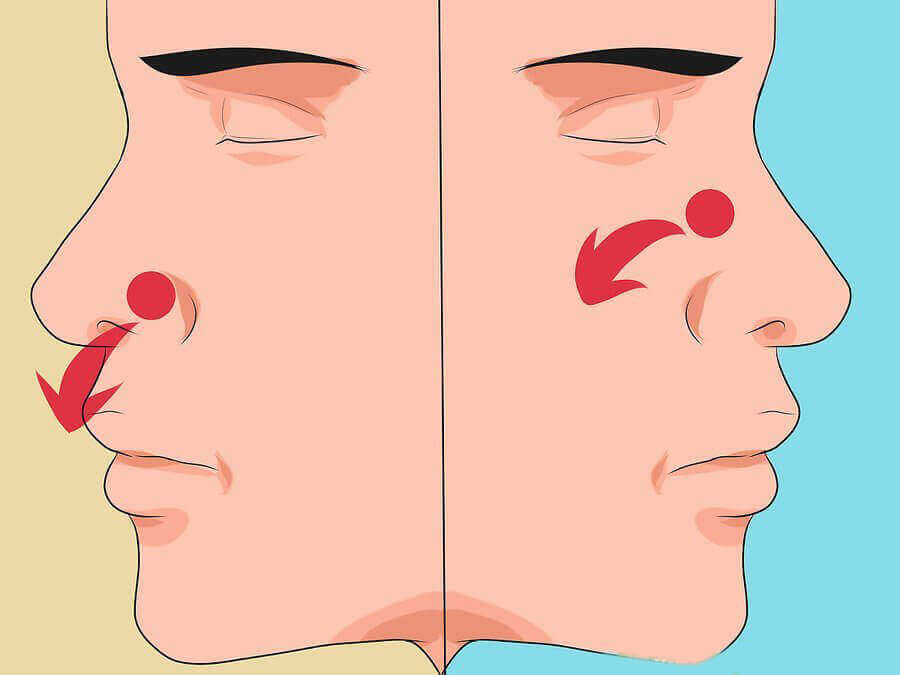Hyperosmia: Oversensitivity to Odors


Written and verified by the doctor Leonardo Biolatto
Oversensitivity to odors is rare as a disorder, but in some people, it’s expressed in a lesser form. After all, many of us know people who clearly perceive odors in a heightened way.
It’s not exactly one of the senses from which the greatest benefit can be derived. For this reason, those who are born with or go through a period of hyperosmia see their quality of life diminished.
The name hyperosmia derives from Greek. It’s a word composed of two smaller parts: hyper – which means something increased – and osmia – which is the sense of smell. Thus, hyperosmia is an oversensitivity to odors.
Don’t confuse this with increased sensitivity in more common situations, for example, in pregnancy. In diagnosed hyperosmia, there’s a lowering of the olfactory threshold. As the threshold lowers, the concentration of substances required in the air to detect an odor also reduces.
Hyperosmia is very rare. There aren’t any reliable statistics to know for sure how many people are affected worldwide. Data are known on the opposite disorder, anosmia – loss of smell – which affects about 0.3 % of the population.
Odor sensitivity disorders
As we’ve already mentioned, hyperosmia is one more abnormal situation within the spectrum of odor sensitivity disorders which entails oversensitivity to odors. However, at the other extreme is anosmia, as mentioned above.
The whole set of these disorders is dysosmia and consists of:
- Hyperosmia: This is the situation we’ll address in this article, excessive olfaction.
- Parosmia: Is another rare condition where the brain doesn’t identify odors correctly and attributes to one odor characteristic of another. These people could consider a pleasant perfume as an unpleasant odor.
- Fantosmia: A hallucination of smell. The person suffering from this circumstance believes they smell something that isn’t really there and that would be impossible to perceive in reality.
- Anosmia: The lack of smell perception at all.

Keep reading: How to Get the Bad Smell out of Towels
Physiological causes of hyperosmia
Increased sensitivity to odors can occur in situations that are physiological, i.e. in the course of normal events. Many specialists believe it isn’t hyperosmia in these cases, but increased sensitivity.
The example par excellence is pregnancy. Especially in the first trimester of pregnancy, women experience an increase in their perception of odors, often to the point that the sense of smell itself can produce nausea typical of this period.
In conclusion, the normal and natural evolution of this hyperosmia of pregnancy is that it tends to disappear as the weeks go by. It’s the same hormonal movements that determine its appearance and subsequent disappearance. In a few pregnant women, the symptom accompanies them for nine months.
However, these are exceptional cases that can be associated with hyperemesis gravidarum, which manifests itself with repeated vomiting and risk of dehydration.
Other physiological causes of oversensitivity to odors
Two other physiological situations of increased odor sensitivity are menopause and pre-feeding times. In menopause, hormonal changes are once again the culprit. Before meals, on the other hand, oversensitivity to odors is an instinctive fact that stimulates appetite.
- Brain tumors: If the development of a brain tumor is located in the areas of the brain that regulate the sense of smell, it may affect it.
- Cystic fibrosis: Cystic fibrosis is a disease that tends to be located in the lung and pancreas. However, by affecting several glands and producing extreme mucus, it clogs the airways, altering the sense of smell.
- Hyperthyroidism: A link has been found between hyperthyroidism and hyperosmia when framed in Graves-Basedow disease.
- Lyme disease: This condition is an infection by a bacterium. Tick bits introduce the microorganism into the human body. Although the general symptoms resemble the flu, among the signs, the possibility of hyperosmia stands out.
- Vitamin B12 deficiency: In nutritional deficiencies, there’s a lack of vitamins. So when vitamin B12 levels drop, it affects the nervous system. However, if the affectation involves nerves involved in the sense of smell, hyperosmia could appear.
- Migraines: Before the actual migraine attack some cases begin with an aura. The aura is a series of signs that often come before a migraine headache. Among these signs, increased sensitivity to odors is one possibility.
Learn more about: Symptoms and Treatment of Migraines in Children
Oversensitivity to odors
In conclusion, if you sense that you have an oversensitivity to odors, it’s most likely a physiological trait or a particular temporary increase in your sense of smell. You shouldn’t be concerned in the first instance.
However, if you consider that your sense of smell is excessively powerful and you notice that it affects your quality of life, then ask a medical expert. A few questions from the professional and a few studies will be able to guide you in the diagnosis.
All cited sources were thoroughly reviewed by our team to ensure their quality, reliability, currency, and validity. The bibliography of this article was considered reliable and of academic or scientific accuracy.
- Finelli PF, Mair RG (2008). Disturbances of smell and taste. En: Bradley WG, Daroff RB, Fenichel Gm, Jankovich J (Eds). Neurology in clinical practice, (pp 263-270). Philadelphia: Elsevier.
- Harris, T. “A Case of Hyperosmia.” Ann. Otol., St. Louis 16 (1907): 74-76.
- Kanwar, S. “Hyperosmia and hyposmia (First report) with burning mouth syndrome: case report.” Reactions 1628 (2016): 310-19.
This text is provided for informational purposes only and does not replace consultation with a professional. If in doubt, consult your specialist.









